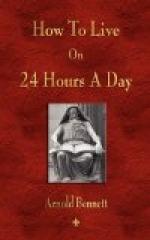Now, if you have read, say, Mr. Krehbiel’s “How to Listen to Music” (which can be got at any bookseller’s for less than the price of a stall at the Alhambra, and which contains photographs of all the orchestral instruments and plans of the arrangement of orchestras) you would next go to a promenade concert with an astonishing intensification of interest in it. Instead of a confused mass, the orchestra would appear to you as what it is—a marvellously balanced organism whose various groups of members each have a different and an indispensable function. You would spy out the instruments, and listen for their respective sounds. You would know the gulf that separates a French horn from an English horn, and you would perceive why a player of the hautboy gets higher wages than a fiddler, though the fiddle is the more difficult instrument. You would live at a promenade concert, whereas previously you had merely existed there in a state of beatific coma, like a baby gazing at a bright object.
The foundations of a genuine, systematic knowledge of music might be laid. You might specialise your inquiries either on a particular form of music (such as the symphony), or on the works of a particular composer. At the end of a year of forty-eight weeks of three brief evenings each, combined with a study of programmes and attendances at concerts chosen out of your increasing knowledge, you would really know something about music, even though you were as far off as ever from jangling “The Maiden’s Prayer” on the piano.
“But I hate music!” you say. My dear sir, I respect you.
What applies to music applies to the other arts. I might mention Mr. Clermont Witt’s “How to Look at Pictures,” or Mr. Russell Sturgis’s “How to Judge Architecture,” as beginnings (merely beginnings) of systematic vitalising knowledge in other arts, the materials for whose study abound in London.
“I hate all the arts!” you say. My dear sir, I respect you more and more.
I will deal with your case next, before coming to literature.
X
NOTHING IN LIFE IS HUMDRUM
Art is a great thing. But it is not the greatest. The most important of all perceptions is the continual perception of cause and effect—in other words, the perception of the continuous development of the universe—in still other words, the perception of the course of evolution. When one has thoroughly got imbued into one’s head the leading truth that nothing happens without a cause, one grows not only large-minded, but large-hearted.
It is hard to have one’s watch stolen, but one reflects that the thief of the watch became a thief from causes of heredity and environment which are as interesting as they are scientifically comprehensible; and one buys another watch, if not with joy, at any rate with a philosophy that makes bitterness impossible. One loses, in the study of cause and effect, that absurd air which so many people have of being always shocked and pained by the curiousness of life. Such people live amid human nature as if human nature were a foreign country full of awful foreign customs. But, having reached maturity, one ought surely to be ashamed of being a stranger in a strange land!




